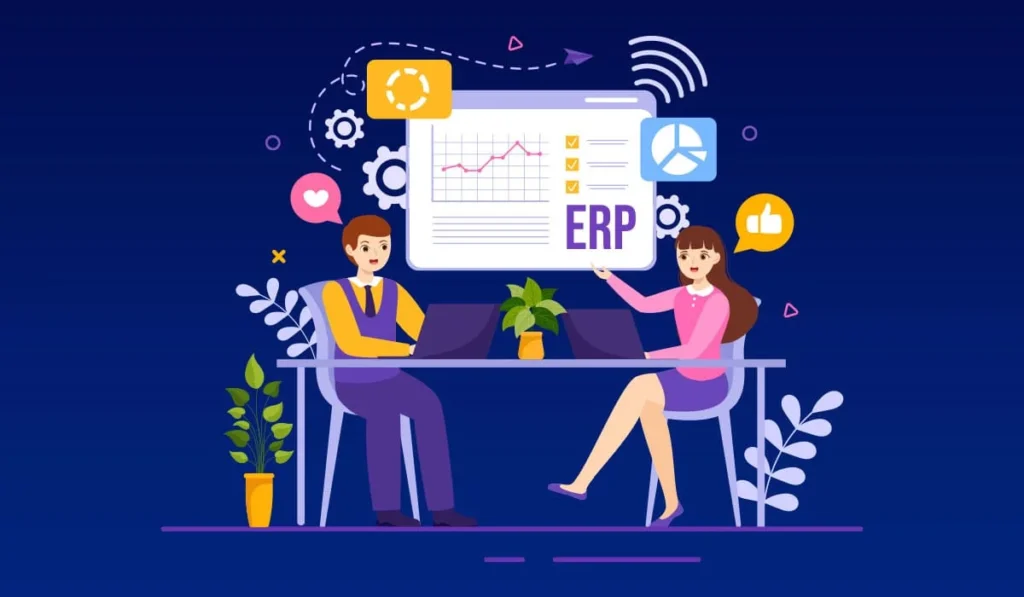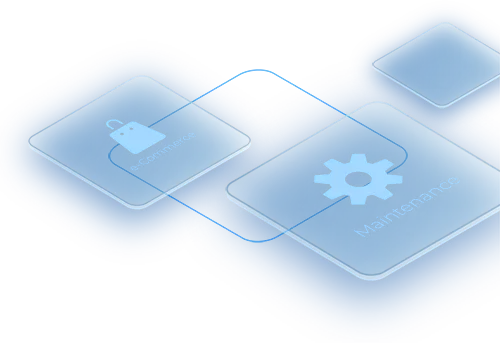
Why Contracting Businesses Need ERP Software

Why Contracting Businesses Need ERP Software
In the modern construction industry, success demands more than just skilled workmanship and effective project management.
Contracting businesses are increasingly turning to advanced technologies to boost efficiency, streamline project workflows, and drive profitability.
ERP (Enterprise Resource Planning) systems have become essential for construction companies, offering comprehensive solutions to optimize operations.
The use of ERP helps enhance project oversight and strengthen financial management.
Understanding the importance Of ERP Systems in the Construction Industry is key for businesses aiming to excel in this competitive field.
In this blog, we will explore how ERP systems function and their major benefits.
We will also discuss the core features the contracting businesses should prioritize when selecting ERP software.
Content Index
- How ERP Systems Work
- Key Benefits for Contracting Businesses
- Core Features of ERP Software for Contracting
- Choosing the Right ERP Software
- Conclusion

How ERP Systems Work
ERP software integrates various business functions into a single, cohesive system.
For contracting businesses, this means that processes such as project management, human resources, and financial planning are interconnected.
Inventory management and compliance are also fully automated, ensuring smoother operations, improved accuracy, and enhanced efficiency across the board.
With ERP, data flows seamlessly between departments, allowing for real-time decision-making and operational visibility.
This automation eliminates manual processes, reduces errors, and makes sure that everyone has access to accurate and up-to-date information.
The importance of ERP systems in the construction industry lies in their ability to centralize and optimize all aspects of a project.
Key Benefits for Contracting Businesses
For contracting businesses, the significance of ERP Systems is evident through the numerous advantages they offer.
Implementing ERP software can translate your business into higher operational efficiency and better decision-making capabilities.
Here’s a closer look at the key benefits of ERP systems for the success of your contracting operations.
Streamlined Operations
Efficiency is the basic foundation of a successful contracting business and an ERP System offers it without much complexity.
ERP systems streamline operations by integrating various functions into a single platform where everything can be easily sorted.
This integration eliminates redundant tasks, reduces manual data entry, and automates routine processes.
For contracting businesses, this means improved workflow management, reduced administrative burden, and faster project turnaround times.
With real-time data access, teams can make informed decisions quickly, ensuring smoother day-to-day operations and minimizing disruptions.
Improved Project Management
Effective project management is crucial for delivering projects on time and within budget.
ERP systems provide comprehensive tools for planning, scheduling, and tracking project progress.
Features like Gantt charts, milestone tracking, and task management allow project managers to oversee every aspect of a project from start to finish.
By having a centralized view of project timelines, resources, and budgets, businesses can identify potential issues early.
This allows them to adjust plans as needed and ensure that projects remain on track.
This enhanced visibility and control translate to higher success rates and better project outcomes.
Enhanced Financial Control
Managing finances effectively is vital for the profitability and sustainability of contracting businesses.
ERP systems offer robust and secure financial management capabilities that streamline budgeting, accounting, and financial reporting.
With ERP software, businesses can track expenses, manage cash flow, and generate accurate financial statements with ease.
Real-time insights into financial performance help managers make informed decisions, optimize spending, and ensure that projects are financially possible.
The importance of ERP systems in the construction industry is evident as these systems integrate financial data with project management.
This provides a comprehensive view of cost management and helps businesses maintain control over their financial health.
Better Resource Management
In the construction industry, efficient resource management can make or completely break a project.
ERP systems enhance resource management by providing detailed insights into the utilization of labor, materials, and equipment.
Businesses can track inventory levels, monitor equipment usage, and manage workforce allocation more effectively.
This leads to better planning, reduced wastage, and optimal use of resources.
By ensuring that the right resources are available at the right time, ERP systems help contracting businesses improve productivity and reduce operational costs.
Increased Compliance and Risk Management
Compliance with industry regulations and effective risk management are critical for mitigating potential issues and avoiding costly penalties.
ERP systems assist contracting businesses in maintaining compliance by tracking regulatory requirements.
They also help manage documentation and ensure adherence to standards.
ERP software also helps identify and manage risks by providing tools for risk assessment, incident tracking, and mitigation planning.
ERP systems also help to centralize compliance and risk management processes.
This enhancement allows a company to address challenges proactively and ensure regulatory adherence.
Core Features of ERP Software for Contracting
The importance of ERP Systems in the Construction Industry becomes even more evident when examining the core features.
These features provide specialized tools for managing complex construction operations.
Project Management
ERP systems provide robust project management tools that help track project progress, manage timelines, and allocate resources efficiently.
This includes features for scheduling, task management, and real-time updates, ensuring that every aspect of a project is monitored and controlled.
This also helps in completing the projects on time and within budget.
Financial Management
Financial management is crucial for maintaining the profitability and financial health of a contracting business.
ERP software includes comprehensive financial tools that handle budgeting, expense tracking, invoicing, and financial reporting.
These features offer transparency and control over financial operations, helping businesses avoid cost overruns and ensure accurate financial reporting.
Human Resources
Managing a workforce in the contracting industry involves tracking employee time, managing labor costs, and ensuring compliance with labor regulations.
ERP systems offer HR modules that streamline processes such as payroll management, time tracking, and employee record management.
This ensures that HR tasks are handled efficiently and accurately.
Supply Chain and Inventory Management
Efficient supply chain and inventory management are critical for construction projects to avoid delays and maintain cost control.
ERP software includes features for tracking inventory levels, managing procurement, and overseeing supplier relationships.
These tools ensure that materials and equipment are available when needed, optimizing the flow of resources throughout the project lifecycle.
Analytics and Reporting
Advanced analytics and reporting features in ERP systems provide valuable insights into project performance and business operations.
These tools enable contractors to generate detailed reports, monitor key performance indicators (KPIs), and analyze data trends.
With accurate and timely information, businesses can make informed decisions that enhance project outcomes and drive overall success.
Choosing the Right ERP Software
Selecting the right ERP software is crucial to maximizing the importance of ERP Systems in the Construction Industry.
With many options available, businesses must choose an ERP system that aligns with their specific needs and objectives.
Here are the key factors to consider when choosing ERP software for your construction business:
Industry-Specific Features
Opt for ERP software that offers features tailored specifically for the construction industry.
These may include tools for project management, subcontractor coordination, and compliance tracking.
Such industry-specific features ensure that the ERP system can handle the unique challenges and requirements of construction projects.
Scalability
Your ERP system should be scalable to accommodate the growth of your business.
As your projects and workforce expand, the software should be able to handle increased data volumes.
It should also manage more complex operations without compromising performance.
Scalability guarantees that your ERP system will remain a valued asset as your firm grows.
Integration Capabilities
An effective ERP system should integrate seamlessly with your existing software and tools.
Look for solutions that offer robust integration capabilities with CRM systems, accounting software, and other essential applications.
This will enable smooth data transfer and reduce the need for manual data entry, leading to greater efficiency and accuracy.
User-Friendly Interface
A user-friendly interface is crucial for ensuring that your team can navigate the ERP system with ease.
The software should have an intuitive design that simplifies tasks and reduces the learning curve.
This will help ensure that all team members can utilize the system effectively, leading to quicker adoption and better overall use.
Customization Options
Every construction company has different procedures and needs.
Select an ERP system that allows you to customize the program to meet your unique requirements.
Customizable features allow you to configure workflows, reporting, and dashboards to align with your business operations.
This enhances the system’s relevance and effectiveness while ensuring it adapts seamlessly to your evolving needs and industry demands.
Reporting and Analytics
Robust reporting and analytics capabilities are essential for making informed decisions.
The ERP software should provide comprehensive reporting tools and data analytics to track project performance, financial metrics, and operational efficiency.
These insights are crucial for optimizing processes and achieving better outcomes.
Support and Training
Adequate support and training are vital for a successful ERP implementation.
Ensure that the ERP vendor offers comprehensive training programs and ongoing support to assist with system setup, troubleshooting, and user queries.
Effective support will help your team make the most of the ERP system and resolve any issues promptly.
Cost
While cost is a significant factor, it should be considered alongside the value the ERP system provides.
Evaluate the total cost of ownership, including initial implementation, licensing fees, and ongoing maintenance.
Ensure that the investment aligns with your budget and delivers a strong return on investment through increased efficiency and productivity.
Vendor Reputation
Choose an ERP vendor with a strong reputation and proven track record in the construction industry.
Research customer reviews, case studies, and testimonials to assess the vendor’s reliability and software quality.
A reputable vendor will offer a reliable product and excellent customer service.
Compliance and Security
Given the sensitive nature of construction data, the ERP software should adhere to industry standards for compliance and security.
Look for systems that offer robust data protection features, including encryption, access controls, and compliance with relevant regulations.
Ensuring data security and regulatory compliance will protect your business from potential risks.
For contracting businesses looking to invest in ERP software, EBR’s ERP solutions provide a comprehensive and customizable platform.
Conclusion
The importance of ERP Systems in the Construction Industry cannot be ignored or underestimated.
These systems streamline complex operations, improve project management, and enhance overall business efficiency.
Investing in the right ERP software enhances financial control, optimizes resources, and boosts long-term profitability for contracting businesses.
As the industry continues to evolve, having an integrated and scalable solution will be key to staying competitive and ensuring project success.
Let's Connect!
Are you currently exploring software solutions for your business? 🤔
Great! What’s the single biggest challenge you’d like a software solution to solve for your business? 🎯
💡 Suggested Solution Ideas:
Just one more step! Share your details so our experts can connect with you personally and discuss tailored solutions. 🤝
Thank You for Connecting! 🎉
We've received your information and a specialist will be in touch with you very shortly to discuss how we can help your business thrive.
In the meantime, feel free to browse our resources or reach out if you have immediate questions.
Understood! 🙏
No worries if you're not exploring software solutions right now. Our door is always open if your needs change!
Feel free to explore our other offerings or connect with us anytime.
Featured






